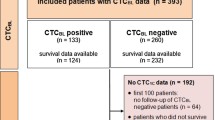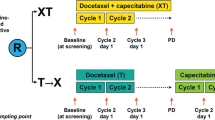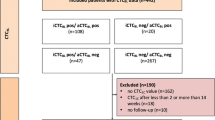Abstract
Purpose
Serial longitudinal enumeration of circulating tumor cells (CTCs) has shown its prognostic value on progression-free survival and overall survival (OS) in patients with stage IV breast cancer. This study prospectively evaluated the role of CTCs as a prognostic marker during further progression of metastatic breast cancer (MBC).
Methods
Among 476 MBC patients recruited between 2010 and 2015, the 103 patients with a known CTC status at baseline (CTCBL) and within 4 weeks of tumor progression (CTCPD) were included. Progressive disease (PD) was defined according to the Response Evaluation Criteria in Solid Tumors (RECIST, version 1.1). Using the CellSearch method, < 5 and ≥ 5 CTCs per 7.5 ml blood were determined as negative and positive, respectively. A shift in CTC status from baseline to progression (\({\text {CTC}_\text {BL}}^+\) to \({\text {CTC}_\text {PD}}^-\) and vice versa) was considered as alternating KineticsBL–PD.
Results
Median follow-up was 29.9 [21.2, 40.0] months. CTCPD positivity (37%, n = 38) was associated with a significantly shorter OS than CTCPD negativity (8.0 [5.1, 10.9] vs 22.6 [15.3, 39.8] months; P < 0.001). Alternating KineticsBL–PD was observed in 24% of the patients. This significantly changed the OS prediction of \({\text {CTC}_\text {BL}}^+\) patients (\({{\text {CTC}_\text {BL}}^+}{{\text {CTC}_\text {PD}}^-}\) vs \({{\text {CTC}_\text {BL}}^+}{{\text {CTC}_\text {PD}}^+}\), 11.4 [9.7, not available (NA)] vs. 7.6 [4.4, 11.5] months; P = 0.044) and \({\text {CTC}_\text {BL}}^-\) patients (\({{\text {CTC}_\text {BL}}^-}{{\text {CTC}_\text {PD}}^+}\) vs. \({{\text {CTC}_\text {BL}}^-}{{\text {CTC}_\text {PD}}^-}\), 8.4 [4.0, NA] vs. 22.6 [18.9, NA] months, respectively; P < 0.001).
Prediction of survival was significantly improved (P = 0.002) by adding CTCPD status to clinicopathological characteristics and CTCBL status.
Conclusions
CTC status upon further disease progression is a prognostic factor that could significantly improve well-established models. Thus, it represents a potential additional instrument supporting treatment decision.



Similar content being viewed by others
Abbreviations
- MBC:
-
Metastatic breast cancer
- CTCs:
-
Circulating tumor cells
- PFS:
-
Progression-free survival
- OS:
-
Overall survival
- CEA:
-
Carcinoembryonic antigen
- CA15-3:
-
Cancer antigen 15-3
- iCTCs:
-
Intact circulating tumor cells
- aCTCs:
-
Apoptotic circulating tumor cells
- fCTCs:
-
Enucleated fragments of circulating tumor cells
- NCT:
-
National Center for Tumor Diseases
- REMARK:
-
Reporting recommendations for tumor marker prognostic studies
- RECIST:
-
Response Evaluation Criteria in Solid Tumors
- SD:
-
Stable disease
- PR:
-
Partial response
- CR:
-
Complete response
- PD:
-
Progressive disease
- BL:
-
Baseline/study inclusion
- CTCBL :
-
CTC status at baseline
- CTCPD :
-
CTC status within 4 weeks of tumor progression
- FDA:
-
US Food and Drug Administration
- anti-EpCAM:
-
Anti-epithelial cellular adhesion molecule antibody
- DAPI:
-
4,2-Diamidino-2-phenylindole
- \({\text {CTC}_\text {BL}}^-/{\text {CTC}_\text {BL}}^+\) :
-
Negative/positive CTC status at baseline
- \({\text {CTC}_\text {PD}}^-/{\text {CTC}_\text {PD}}^+\) :
-
Negative/positive CTC status within 4 weeks of tumor progression
- iKineticsBL–PD :
-
Course of intact CTCs from BL to PD
- aKineticsBL–PD :
-
Course of apoptotic CTCs from BL to PD
- fKineticsBL–PD :
-
Course of enucleated fragments of CTCs from BL to PD
- \({\text {Kinetics}_\text {BL-PD}}^{-/+}\) :
-
\({\text {CTC}_\text {BL}}^-\) to \({\text {CTC}_\text {PD}}^+\)
- \({\text {Kinetics}_\text {BL-PD}}^{+/-}\) :
-
\({\text {CTC}_\text {BL}}^+\) to \({\text {CTC}_\text {PD}}^-\)
- \({\text {Kinetics}_\text {BL-PD}}^{+/+}\) :
-
\({\text {CTC}_\text {BL}}^+\) to \({\text {CTC}_\text {PD}}^+\)
- \({\text {Kinetics}_\text {BL-PD}}^{-/-}\) :
-
\({\text {CTC}_\text {BL}}^-\) to \({\text {CTC}_\text {PD}}^-\)
- r s :
-
Spearman correlation coefficient
- CI:
-
Confidence interval
- BIC:
-
Bayesian information criterion
- HR:
-
Hormone receptor or hazard ratio
- HER2:
-
Human epidermal growth factor receptor 2
- ER:
-
Estrogen receptor
- PR:
-
Progesterone receptor
- TNBC:
-
Triple-negative breast cancer
- ctDNA:
-
Circulating tumor DNA
References
Siegel RL, Miller KD, Jemal A (2018) Cancer statistics, 2018. CA Cancer J Clin 68(1):7–30. https://doi.org/10.3322/caac.21442
American cancer Society (2018) Cancer facts and figs. 2018. https://www.cancer.org/content/dam/cancer-org/research/cancer-facts-and-statistics/annual-cancer-facts-and-figures/2018/cancer-facts-and-figures-2018.pdf. Accessed 16 Aug 2018
Andre F, Bachelot T, Commo F, Campone M, Arnedos M, Dieras V, Lacroix-Triki M, Lacroix L, Cohen P, Gentien D, Adelaide J, Dalenc F, Goncalves A, Levy C, Ferrero JM, Bonneterre J, Lefeuvre C, Jimenez M, Filleron T, Bonnefoi H (2014) Comparative genomic hybridisation array and DNA sequencing to direct treatment of metastatic breast cancer: a multicentre, prospective trial (SAFIR01/UNICANCER). Lancet Oncol 15(3):267–274. https://doi.org/10.1016/S1470-2045(13)70611-9
Harbeck N, Gnant M (2017) Breast cancer. Lancet 389(10074):1134–1150. https://doi.org/10.1016/S0140-6736(16)31891-8
Chia SK, Speers CH, D’Yachkova Y, Kang A, Malfair-Taylor S, Barnett J, Coldman A, Gelmon KA, O’Reilly SE, Olivotto IA (2007) The impact of new chemotherapeutic and hormone agents on survival in a population-based cohort of women with metastatic breast cancer. Cancer 110(5):973–979. https://doi.org/10.1002/cncr.22867
Clark GM, Sledge GW Jr, Osborne CK, McGuire WL (1987) Survival from first recurrence: relative importance of prognostic factors in 1,015 breast cancer patients. J Clin Oncol 5(1):55–61
Tevaarwerk AJ, Gray RJ, Schneider BP, Smith ML, Wagner LI, Fetting JH, Davidson N, Goldstein LJ, Miller KD, Sparano JA (2013) Survival in patients with metastatic recurrent breast cancer after adjuvant chemotherapy: little evidence of improvement over the past 30 years. Cancer 119(6):1140–1148. https://doi.org/10.1002/cncr.27819
Dawood S, Broglio K, Gonzalez-Angulo AM, Buzdar AU, Hortobagyi GN, Giordano SH (2008) Trends in survival over the past two decades among white and black patients with newly diagnosed stage IV breast cancer. J Clin Oncol 26(30):4891–4898. https://doi.org/10.1200/JCO.2007.14.1168
Largillier R, Ferrero JM, Doyen J, Barriere J, Namer M, Mari V, Courdi A, Hannoun-Levi JM, Ettore F, Birtwisle-Peyrottes I, Balu-Maestro C, Marcy PY, Raoust I, Lallement M, Chamorey E (2008) Prognostic factors in 1,038 women with metastatic breast cancer. Ann Oncol 19(12):2012–2019. https://doi.org/10.1093/annonc/mdn424
Giordano SH, Buzdar AU, Smith TL, Kau SW, Yang Y, Hortobagyi GN (2004) Is breast cancer survival. improving? Cancer 100(1):44–52. https://doi.org/10.1002/cncr.11859
Dawood S, Broglio K, Buzdar AU, Hortobagyi GN, Giordano SH (2010) Prognosis of women with metastatic breast cancer by HER2 status and trastuzumab treatment: an institutional-based review. J Clin Oncol 28(1):92–98. https://doi.org/10.1200/JCO.2008.19.9844
Wallwiener M, Riethdorf S, Hartkopf AD, Modugno C, Nees J, Madhavan D, Sprick MR, Schott S, Domschke C, Baccelli I, Schonfisch B, Burwinkel B, Marme F, Heil J, Sohn C, Pantel K, Trumpp A, Schneeweiss A (2014) Serial enumeration of circulating tumor cells predicts treatment response and prognosis in metastatic breast cancer: a prospective study in 393 patients. BMC Cancer 14:512. https://doi.org/10.1186/1471-2407-14-512
de Duenas EM, Hernandez AL, Zotano AG, Carrion RM, Lopez-Muniz JI, Novoa SA, Rodriguez AL, Fidalgo JA, Lozano JF, Gasion OB, Carrascal EC, Capilla AH, Lopez-Barajas IB, Mateu MM, de Ceballos Reyna MH, Ferrando AO, Janez NM, Ballerini VC, Torres AA, Catalan G, Saenz JA, Menjon S, Gonzalez-Angulo AM (2014) Prospective evaluation of the conversion rate in the receptor status between primary breast cancer and metastasis: results from the GEICAM 2009-03 ConvertHER study. Breast Cancer Res Treat 143(3):507–515. https://doi.org/10.1007/s10549-013-2825-2
Sari E, Guler G, Hayran M, Gullu I, Altundag K, Ozisik Y (2011) Comparative study of the immunohistochemical detection of hormone receptor status and HER-2 expression in primary and paired recurrent/metastatic lesions of patients with breast cancer. Med Oncol 28(1):57–63. https://doi.org/10.1007/s12032-010-9418-2
Wallwiener M, Hartkopf AD, Riethdorf S, Nees J, Sprick MR, Schonfisch B, Taran FA, Heil J, Sohn C, Pantel K, Trumpp A, Schneeweiss A (2015) The impact of HER2 phenotype of circulating tumor cells in metastatic breast cancer: a retrospective study in 107 patients. BMC Cancer 15:403. https://doi.org/10.1186/s12885-015-1423-6
Van Poznak C, Somerfield MR, Bast RC, Cristofanilli M, Goetz MP, Gonzalez-Angulo AM, Hicks DG, Hill EG, Liu MC, Lucas W, Mayer IA, Mennel RG, Symmans WF, Hayes DF, Harris LN (2015) Use of biomarkers to guide decisions on systemic therapy for women with metastatic breast cancer: American Society of Clinical Oncology clinical practice guideline. J Clin Oncol 33(24):2695–2704. https://doi.org/10.1200/JCO.2015.61.1459
Wallwiener M, Hartkopf AD, Baccelli I, Riethdorf S, Schott S, Pantel K, Marme F, Sohn C, Trumpp A, Rack B, Aktas B, Solomayer EF, Muller V, Janni W, Schneeweiss A, Fehm TN (2013) The prognostic impact of circulating tumor cells in subtypes of metastatic breast cancer. Breast Cancer Res Treat 137(2):503–510. https://doi.org/10.1007/s10549-012-2382-0
Pantel K, Speicher MR (2016) The biology of circulating tumor cells. Oncogene 35(10):1216–1224. https://doi.org/10.1038/onc.2015.192
Gerlinger M, Rowan AJ, Horswell S, Larkin J, Endesfelder D, Gronroos E, Martinez P, Matthews N, Stewart A, Tarpey P, Varela I, Phillimore B, Begum S, McDonald NQ, Butler A, Jones D, Raine K, Latimer C, Santos CR, Nohadani M, Eklund AC, Spencer-Dene B, Clark G, Pickering L, Stamp G, Gore M, Szallasi Z, Downward J, Futreal PA, Swanton C (2012) Intratumor heterogeneity and branched evolution revealed by multiregion sequencing. N Engl J Med 366(10):883–892
Cristofanilli M (2014) Circulating tumour cells: telling the truth about metastasis. Lancet Oncol 15(4):365–366. https://doi.org/10.1016/S1470-2045(14)70091-9
Baccelli I, Schneeweiss A, Riethdorf S, Stenzinger A, Schillert A, Vogel V, Klein C, Saini M, Bauerle T, Wallwiener M, Holland-Letz T, Hofner T, Sprick M, Scharpff M, Marme F, Sinn HP, Pantel K, Weichert W, Trumpp A (2013) Identification of a population of blood circulating tumor cells from breast cancer patients that initiates metastasis in a xenograft assay. Nat Biotechnol 31(6):539–544. https://doi.org/10.1038/nbt.2576
Bidard FC, Peeters DJ, Fehm T, Nole F, Gisbert-Criado R, Mavroudis D, Grisanti S, Generali D, Garcia-Saenz JA, Stebbing J, Caldas C, Gazzaniga P, Manso L, Zamarchi R, de Lascoiti AF, De Mattos-Arruda L, Ignatiadis M, Lebofsky R, van Laere SJ, Meier-Stiegen F, Sandri MT, Vidal-Martinez J, Politaki E, Consoli F, Bottini A, Diaz-Rubio E, Krell J, Dawson SJ, Raimondi C, Rutten A, Janni W, Munzone E, Caranana V, Agelaki S, Almici C, Dirix L, Solomayer EF, Zorzino L, Johannes H, Reis-Filho JS, Pantel K, Pierga JY, Michiels S (2014) Clinical validity of circulating tumour cells in patients with metastatic breast cancer: a pooled analysis of individual patient data. Lancet Oncol 15(4):406–414. https://doi.org/10.1016/S1470-2045(14)70069-5
Cristofanilli M, Budd GT, Ellis MJ, Stopeck A, Matera J, Miller MC, Reuben JM, Doyle GV, Allard WJ, Terstappen LW, Hayes DF (2004) Circulating tumor cells, disease progression, and survival in metastatic breast cancer. N Engl J Med 351(8):781–791. https://doi.org/10.1056/NEJMoa040766
Cristofanilli M, Hayes DF, Budd GT, Ellis MJ, Stopeck A, Reuben JM, Doyle GV, Matera J, Allard WJ, Miller MC, Fritsche HA, Hortobagyi GN, Terstappen LW (2005) Circulating tumor cells: a novel prognostic factor for newly diagnosed metastatic breast cancer. J Clin Oncol 23(7):1420–1430. https://doi.org/10.1200/JCO.2005.08.140
Jansson S, Bendahl PO, Larsson AM, Aaltonen KE, Ryden L (2016) Prognostic impact of circulating tumor cell apoptosis and clusters in serial blood samples from patients with metastatic breast cancer in a prospective observational cohort. BMC Cancer 16:433. https://doi.org/10.1186/s12885-016-2406-y
Deutsch TM, Riethdorf S, Nees J, Hartkopf AD, Schonfisch B, Domschke C, Sprick MR, Schutz F, Brucker SY, Stefanovic S, Sohn C, Pantel K, Trumpp A, Schneeweiss A, Wallwiener M (2016) Impact of apoptotic circulating tumor cells (aCTC) in metastatic breast cancer. Breast Cancer Res Treat 160(2):277–290. https://doi.org/10.1007/s10549-016-3997-3
Kallergi G, Konstantinidis G, Markomanolaki H, Papadaki MA, Mavroudis D, Stournaras C, Georgoulias V, Agelaki S (2013) Apoptotic circulating tumor cells in early and metastatic breast cancer patients. Mol Cancer Ther 12(9):1886–1895. https://doi.org/10.1158/1535-7163.MCT-12-1167
Madhavan D, Zucknick M, Wallwiener M, Cuk K, Modugno C, Scharpff M, Schott S, Heil J, Turchinovich A, Yang R, Benner A, Riethdorf S, Trumpp A, Sohn C, Pantel K, Schneeweiss A, Burwinkel B (2012) Circulating miRNAs as surrogate markers for circulating tumor cells and prognostic markers in metastatic breast cancer. Clin Cancer Res 18(21):5972–5982. https://doi.org/10.1158/1078-0432.CCR-12-1407
Baccelli I, Stenzinger A, Vogel V, Pfitzner BM, Klein C, Wallwiener M, Scharpff M, Saini M, Holland-Letz T, Sinn HP, Schneeweiss A, Denkert C, Weichert W, Trumpp A (2014) Co-expression of MET and CD47 is a novel prognosticator for survival of luminal breast cancer patients. OncoTarget 5(18):8147–8160. https://doi.org/10.18632/oncotarget.2385
McShane LM, Altman DG, Sauerbrei W, Taube SE, Gion M, Clark GM, Statistics Subcommittee of NCIEWGoCD (2006) REporting recommendations for tumor MARKer prognostic studies (REMARK). Breast Cancer Res Treat 100(2):229–235. https://doi.org/10.1007/s10549-006-9242-8
Eisenhauer EA, Therasse P, Bogaerts J, Schwartz LH, Sargent D, Ford R, Dancey J, Arbuck S, Gwyther S, Mooney M, Rubinstein L, Shankar L, Dodd L, Kaplan R, Lacombe D, Verweij J (2009) New response evaluation criteria in solid tumours: revised RECIST guideline (version 1.1). Eur J Cancer 45(2):228–247. https://doi.org/10.1016/j.ejca.2008.10.026
Riethdorf S, Fritsche H, Muller V, Rau T, Schindlbeck C, Rack B, Janni W, Coith C, Beck K, Janicke F, Jackson S, Gornet T, Cristofanilli M, Pantel K (2007) Detection of circulating tumor cells in peripheral blood of patients with metastatic breast cancer: a validation study of the CellSearch system. Clin Cancer Res 13(3):920–928. https://doi.org/10.1158/1078-0432.CCR-06-1695
Bidard FC, Proudhon C, Pierga JY (2016) Circulating tumor cells in breast cancer. Mol Oncol 10(3):418–430. https://doi.org/10.1016/j.molonc.2016.01.001
Clark TG, Altman DG, De Stavola BL (2002) Quantification of the completeness of follow-up. Lancet 359(9314):1309–1310
von Allmen RS, Weiss S, Tevaearai HT, Kuemmerli C, Tinner C, Carrel TP, Schmidli J, Dick F (2015) Completeness of follow-up determines validity of study findings: results of a prospective repeated measures cohort study. PLoS ONE 10(10):e0140817. https://doi.org/10.1371/journal.pone.0140817
Liu MC, Shields PG, Warren RD, Cohen P, Wilkinson M, Ottaviano YL, Rao SB, Eng-Wong J, Seillier-Moiseiwitsch F, Noone AM, Isaacs C (2009) Circulating tumor cells: a useful predictor of treatment efficacy in metastatic breast cancer. J Clin Oncol 27(31):5153–5159. https://doi.org/10.1200/JCO.2008.20.6664
Pierga JY, Hajage D, Bachelot T, Delaloge S, Brain E, Campone M, Dieras V, Rolland E, Mignot L, Mathiot C, Bidard FC (2012) High independent prognostic and predictive value of circulating tumor cells compared with serum tumor markers in a large prospective trial in first-line chemotherapy for metastatic breast cancer patients. Ann Oncol 23(3):618–624. https://doi.org/10.1093/annonc/mdr263
Nole F, Munzone E, Zorzino L, Minchella I, Salvatici M, Botteri E, Medici M, Verri E, Adamoli L, Rotmensz N, Goldhirsch A, Sandri MT (2008) Variation of circulating tumor cell levels during treatment of metastatic breast cancer: prognostic and therapeutic implications. Ann Oncol 19(5):891–897. https://doi.org/10.1093/annonc/mdm558
Budd GT, Cristofanilli M, Ellis MJ, Stopeck A, Borden E, Miller MC, Matera J, Repollet M, Doyle GV, Terstappen LW, Hayes DF (2006) Circulating tumor cells versus imaging—predicting overall survival in metastatic breast cancer. Clin Cancer Res 12(21):6403–6409. https://doi.org/10.1158/1078-0432.CCR-05-1769
Yu M, Bardia A, Wittner BS, Stott SL, Smas ME, Ting DT, Isakoff SJ, Ciciliano JC, Wells MN, Shah AM, Concannon KF, Donaldson MC, Sequist LV, Brachtel E, Sgroi D, Baselga J, Ramaswamy S, Toner M, Haber DA, Maheswaran S (2013) Circulating breast tumor cells exhibit dynamic changes in epithelial and mesenchymal composition. Science 339(6119):580–584. https://doi.org/10.1126/science.1228522
Beerling E, Seinstra D, de Wit E, Kester L, van der Velden D, Maynard C, Schafer R, van Diest P, Voest E, van Oudenaarden A, Vrisekoop N, van Rheenen J (2016) Plasticity between epithelial and mesenchymal states unlinks EMT from metastasis-enhancing stem cell capacity. Cell Rep 14(10):2281–2288. https://doi.org/10.1016/j.celrep.2016.02.034
Smerage JB, Barlow WE, Hortobagyi GN, Winer EP, Leyland-Jones B, Srkalovic G, Tejwani S, Schott AF, O’Rourke MA, Lew DL, Doyle GV, Gralow JR, Livingston RB, Hayes DF (2014) Circulating tumor cells and response to chemotherapy in metastatic breast cancer: SWOG S0500. J Clin Oncol 32(31):3483–3489. https://doi.org/10.1200/JCO.2014.56.2561
Rossi G, Mu Z, Rademaker AW, Austin LK, Strickland KS, Costa RLB, Nagy RJ, Zagonel V, Taxter TJ, Behdad A, Wehbe FH, Platanias LC, Gradishar WJ, Cristofanilli M (2018) Cell-free DNA and circulating tumor cells: comprehensive liquid biopsy analysis in advanced breast cancer. Clin Cancer Res 24(3):560–568. https://doi.org/10.1158/1078-0432.CCR-17-2092
Acknowledgements
The authors thank all the patients who participated in this study. We gratefully acknowledge the medical and nursing staff at the National Center for Tumor Diseases (NCT) Heidelberg and the University Hospital Heidelberg, especially Mirjam Becker, Bettina Mutz, and Martina Scharpff as well as Caroline Modugno for supporting patient recruitment, follow-up, and data collection. We further thank the team involved at University Medical Center Hamburg–Eppendorf for technical assistance during CTC measurement.
Funding
This work was supported by In-house Funds of the National Center for Tumor Diseases (NCT, to AS, no grant number applies). AT has received funding from Swiss Bridge (no grant number applies), the Helmholtz Initiative on Personalized Medicine (iMED, no grant number applies), Europe’s Innovative Medicines Initiative (IMI) Consortium Cancer-ID (115749), the Cancer Core Europe/Transcan Breast Project (01KT1608), the German Federal Ministry of Education and Research (BMBF N02/74829), and the Dietmar Hopp Foundation (no grant number applies).
Author information
Authors and Affiliations
Corresponding author
Ethics declarations
Conflict of interest
FS has served as a Consultant/Advisor for Roche and Novartis and has received Honoraria from Roche, Novartis, and Amgen. FM has served as a Consultant/Advisor for Roche, Pfizer, Novartis, AstraZeneca, and Tesara and has received travel, accommodations, and expenses from Roche, Novartis, Pfizer, AstraZeneca, and Honoraria from Roche, Pfizer, Novartis, Amgen, AstraZeneca, PharmaMar, Genomic Health, and Tesara. MW has provided Expert Testimony for Novartis, has received Honoraria from Novartis and Celgene and travel, accommodations, and expenses from Novartis. AS has received Honoraria from Roche, Celgene, AstraZeneca, Novartis, and Pfizer; research funding from Celgene; and travel, accommodations, and expenses from Roche and Celgene. All remaining authors have declared no conflicts of interest.
Ethical approval
All procedures performed in studies involving human participants were in accordance with the Ethical Standards of the Institutional and/or National Research Committee and with the 1964 Helsinki Declaration and its later amendments or comparable ethical standards. This article does not contain any studies with animals performed by any of the authors.
Informed consent
Informed consent was obtained from all individual participants included in the study.
Electronic supplementary material
Below is the link to the electronic supplementary material.
Rights and permissions
About this article
Cite this article
Jauch, S.F., Riethdorf, S., Sprick, M.R. et al. Sustained prognostic impact of circulating tumor cell status and kinetics upon further progression of metastatic breast cancer. Breast Cancer Res Treat 173, 155–165 (2019). https://doi.org/10.1007/s10549-018-4972-y
Received:
Accepted:
Published:
Issue Date:
DOI: https://doi.org/10.1007/s10549-018-4972-y




